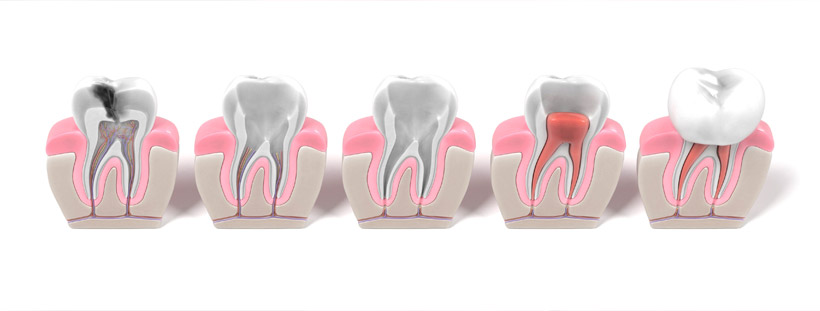Our teeth have dental roots. Inside each root contains the dental pulp encased in what we call a root canal.. The dental pulp consists of a nerve, artery and vein. Endodontics is that specialty of dentistry that deals with the cause, diagnosis, prevention and treatment of the dental pulp.

FAQ:
1.- What is a root canal therapy?
Root canal therapy is the procedure by which the dental pulp is removed usually due to it being infected or necrotic. The root canal is then filled, replacing the dental pulp with a suitable material to maintain the tooth, bone and soft tissue health. It is an effective treatment to help us preserve function and esthetics.
2.- When is root canal therapy indicated?
When the dental pulp is irreversibly affected either such things as trauma, deep caries, the tooth may become sensitive to cold and during chewing. The pain may be constant or intermittent. If left untreated, it may progress to an abscess. It is also possible that the affected tooth becomes discoloured over time. In such cases, rot canal therapy is recommended. It is advisable to have it completed prior to any restorative options including a crown or a bridge.
3.- How many dental visits are required?
The vast majority of root canal treatments can be performed during one single visit. However, in certain occasions, two visit or more may be required. Your endodontist will inform you the number of visits after a thorough examination has been performed.
4.- Is a root canal treatment painful?
The procedure is not usually painful as it is completed under local anesthesia. Once the root canal is completed, slight discomfort may be experienced for some days, especially during chewing. This is most likely due to the inflammation of tissues surrounding the tooth. Fortunately, this discomfort should not last long and medication can be prescribed accordingly.
5.- Can I have a root canal treatment completed even if I have an abscess?
An abscess is pus-containing pocket indicative of advance and severe infection. It is usually due to either infection of the dental pulp or tissue surrounding the tooth. A root canal therapy can be started to treat the abscess. However, it is rarely completed until after the abscess and infection has resolved.
6.- How can I maintain my tooth if it recently underwent a root canal?
Following treatment, the tooth may need a crown or some restoration that is usually completed by your dentist. Once the tooth is protected and sealed from bacteria with the appropriate restoration, the tooth should behave just like the rest of your natural dentition. This means the tooth would require proper cleaning with adequate tooth brushing technique and flossing. Maintaining good oral hygience for endodontically treated teeth is key to their longevity.
7.- Are endodontically treated teeth more fragile?
The final restoration following root canal should not be delayed to avoid any fractures or complications such as re-infection of the canals. Once this restoration is completed, studies have shown the tooth to be as strong as your native vital teeth.
8.- Is there an alternative to endodontic therapy?
The only alternative to endodontic therapy is an extraction of the tooth. Reasons for extraction are vertical fractures, unfavorable crown to root ratio, lack of bone support. Otherwise, it is recommended that the tooth be preserved as currently there are no ideal substitutes that can provide esthetic and functionality than one’s own natural tooth.
9.- What is an endodontist?
An endodontist is a dentist who specializes in maintaining teeth through endodontic therapy. He usually has completed at least an additional two years in the field of endodontics after dental school.





